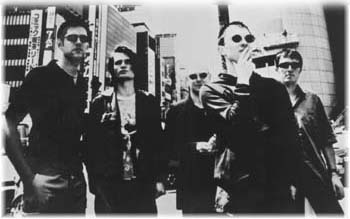![[Metroactive Music]](/music/gifs/music468.gif)
![[Metroactive Music]](/music/gifs/music468.gif)
[ Music Index | Metro | Metroactive Central | Archives ]
Echoes of Rock's Past
Beyond the Bends: On 'OK Computer,' Radiohead (from left, Ed O'Brien, Jonny Greenwood, Phil Selway, Thom Yorke and Colin Greenwood) revives the dirge sound of Echo and the Bunnymen.
The doom and gloom of Echo and the Bunnymen can be heard in Radiohead
By Gina Arnold
SOME 10 YEARS ago, Echo and the Bunnymen failed conspicuously to make it in America. Though touted in the mid-'80s as the most-likely-to-succeed leader of England's neopsychedelic movement (which included the Teardrop Explodes and Robyn Hitchcock and the Egyptians), the Liverpool-based band hit our shores with a great big thud.
Echo and the Bunnymen's American counterpart, R.E.M., managed to "break" that same year, but apparently there was no place on America radio for an arty English guitar outfit with a weird name and a lead singer with a penchant for doom and gloom.
Echo broke up in 1988, and its leader, Ian McCulloch, went solo. But unlike Humpty Dumpty, no band is truly beyond putting together again--and this year, the Bunnymen are back. The band currently consists of three of its original members (minus drummer Pete De Freitas, who died in a car accident in 1989). As a late addition to Live 105's BFD bill at Shoreline in June, the band delivered a set that proved to be a revelation to a crowd that could hardly have been familiar with its decade-old work.
Apparently, Echo and the Bunnymen had just been ahead of their time, as is obvious in the sonics and sensibility of current Echo-like bands such as the Verve Pipe and Radiohead. In the case of the latter, the sensibility comes from an even older fount. Both Echo's McCulloch and Radiohead's Thom Yorke are avowed Jim Morrison fans. They each look like what would happen if the soul of Morrison were translated into a weedy, whey-faced British youth.
Radiohead had a huge hit in 1994 titled "Creep" (not to be confused with the song of the same name by the Fall or with Nirvana's "Negative Creep" or with Beck's "Loser"), and if it didn't sound quite as atmospherically maudlin and majestic as Echo and the Bunnymen's "Ocean Rain" or "Crocodiles," it shared a certain clangy, whooshy, guitar-and-synth sound that's now prevalent on modern-rock radio. Both bands also evince elements of prog-rock; indeed, on Radiohead's 1995 album, The Bends, that aspect predominated.
Echo and the Bunnymen official site.
A fan page for Echo.
Radiohead official site.
A Radiohead fan page.
RADIOHEAD NOW has a new release, OK Computer (Capitol). Sad to say, it's a concept album--all about aliens and the alienation of modern life, and full of references to the deadening effect of technology on mankind. On the song "Karma Police," for example, a man is said to "talk in maths" and to buzz "like a fridge," while on "Fitter, Happier," Yorke likens working in an office environment to being "fitter, healthier and more productive pigs in a cage on antibiotics."
True, Radiohead's lyrics are occasionally inventive, and unlike many of today's thoroughly empty rockers, Yorke does have something--albeit something depressing--to say. But when he sings, "Don't get sentimental, it always ends up drivel," he undermines his own point, since the music that frames the words is so mushy. Musically, Radiohead is terribly dull--a plethora of ballads, synths and Yorke's intolerably whiny voice. Besides, hasn't all this stuff been said before on Dark Side of the Moon?
This points out one of the great ironies of the current music business. Bands like Radiohead are always referred to as "alternative" and "modern." But they sound much more like the Alan Parsons Project than is comfortable. Ironically, Echo and the Bunnymen's latest, Evergreen (London), is a far more enjoyable, not to mention "alternative" album--as well as one of the few reunion albums of the '90s that stands up to the band's old work.
McCulloch has always had a fondness for unicorny and astrological metaphors, and here, as elsewhere, he invokes the goddamn moon, stars and sea again and again and again. But somehow, he's become a might less pretentious. There is nothing on Evergreen as soupily melodramatic as "Killing Moon" or "Silver," and even the songs that drip with sentiment and strings ("Forgiven") are more convincing.
What McCulloch does have is an assured way with melody--and a great, deep voice. Thus, songs like "Don't Let It Get You Down" and "I Want to Be There (When You Come)" are infinitely more direct, rhythmic and appealing than Radiohead's.
"I'm hitting my prime," sings McCulloch on one tune, "and you're wasting my time." He's not referring to Radiohead per se, but it's an apt comment on a great deal of contemporary rock. "Altamont" is another highlight; it is a fast, tricky song slightly reminiscent of the Echo classics "Do It Clean" and "The Cutter."
Evergreen actually boasts many such anthemic and transcendent moments. It's an outstanding record. And yet it's also a disheartening comment on the current state of rock that a 15-year-old band that didn't seem all that groundbreaking on its first go-round is so superior to younger bands. What's even scarier is the idea that Radiohead itself might sound more exciting to us in the year 2007, compared to whatever bilge is coming out then. Such is life.
[ Metro | Metroactive Central | Archives ]

Tom Sheehan

From the July 24-30, 1997 issue of Metro.